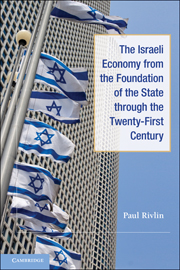Book contents
- Frontmatter
- Contents
- Figures
- Tables
- Appendices
- Preface
- The Israeli Economy from the Foundation of the State through the 21st Century
- One Introduction
- Two The Economy of the Yishuv and Its Legacy
- Three The Economy, 1948–1985
- Four Macro-Economic Developments, Growth, and Policy
- Five Globalization and High Technology
- Six Defense: Service or Burden?
- Seven Israel and the Palestinians
- Eight The Economics of Religion
- Nine The Arab Minority
- Ten Demographic Developments and Socioeconomic Divisions
- Eleven Conclusions
- Appendices
- References
- Index
Nine - The Arab Minority
Published online by Cambridge University Press: 05 June 2012
- Frontmatter
- Contents
- Figures
- Tables
- Appendices
- Preface
- The Israeli Economy from the Foundation of the State through the 21st Century
- One Introduction
- Two The Economy of the Yishuv and Its Legacy
- Three The Economy, 1948–1985
- Four Macro-Economic Developments, Growth, and Policy
- Five Globalization and High Technology
- Six Defense: Service or Burden?
- Seven Israel and the Palestinians
- Eight The Economics of Religion
- Nine The Arab Minority
- Ten Demographic Developments and Socioeconomic Divisions
- Eleven Conclusions
- Appendices
- References
- Index
Summary
Introduction
The Arab community comprises a fifth of the population of Israel and faces serious economic, social, and political problems. This chapter begins with a review of the economic theory of minorities and that of discrimination, the aim being to see what light theoretical work can throw on the status of the Arabs in Israel. The second section examines demographic, economic, educational, and employment development since the British Mandate. Conclusions are then drawn about the relative strength of what might be called endogenous and exogenous factors in explaining the economic development of the Arabs in Israel. Endogenous factors include religion and culture. Exogenous factors are the environment in which the community lives: Is it encouraging or discouraging and discriminatory? Is the state active or passive or even negative in helping the minority develop? Endogenous factors such as motivation, education, and even culture and beliefs are affected by exogenous factor over time. This differentiation, although tenuous, is analytically useful.
The Economic Theory of Minorities
Most of the theoretical work on minorities has been about economically successful ones. It has analyzed which traditions, cultures, and beliefs minorities have that have enabled them to succeed. Most of the work on minorities has been on groups, such as Jews, Huguenots, and the overseas Chinese, that succeeded in the face of discrimination.
- Type
- Chapter
- Information
- Publisher: Cambridge University PressPrint publication year: 2010



